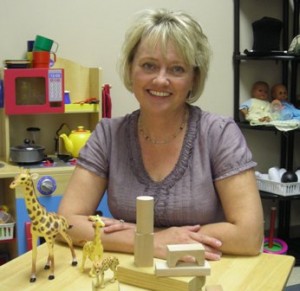 Tell me about your practice...
Tell me about your practice...
I am a solo practitioner with an office in beautiful Palm Beach Gardens, Florida. I opened my private practice a year ago. As an experienced child, adolescent and family therapist, I understand how difficult it can be to find resources and help for children and adolescents who are suffering from emotional and behavioral issues. In my private practice I specialize in working with children 6+ and adolescents who are experiencing difficulty in their functioning and ability to navigate life’s challenges and relationships. I enjoy seeing children and families learn how to respectfully express their emotions and improve communication. Children and adolescent’s unique situations are addressed with a deep understanding of today’s youth and their specific challenges.
I am an Accredited Standard Triple P Provider (Level 4 & 5). Triple P is an evidence-based multi-level family intervention and parenting support strategy which is designed to reduce the prevalence of behavioral and emotional problems in children and adolescents.
Why did you decide to open a private practice?
I entered graduate school in mid-life with the goal of opening a private practice. My twenty years of experience working in business (advertising & marketing) prior to entering the field have assisted me in knowing how to reach my target audience. I also wanted the freedom to set my own hours and to foster hope and build relationships with my clients. I knew that having my own practice would allow me to achieve all of these goals.
Clients that therapists find to be the most “difficult” are sometimes the ones who can teach them the most. What have you learned from your toughest clients?
Young children and adolescents with challenging behavior problems try the patience of parents and caregivers and can be challenging for therapists. I have learned from the most “difficult” clients the importance of meeting them where they are, along with being patient and finding ways to connect and build rapport. By being with a child and engaging them in art, play or games I gain an understanding of what the child’s interests and needs are. Once a child is heard and understood we can begin implementing strategies to meet the child’s needs and overcome challenging behaviors. Understanding the child from the child’s perspective is the key to the process.
What’s your biggest pet peeve about private practice?
The fluctuating streams of income. There are cycles when I’m busy and when I’m not. I continue to learn and expand my knowledge of marketing utilizing social media and networking to grow my practice. I supplement my income with offering trainings to schools, other professionals, and coaching.
How did you discover or develop your practice “niche”?
My passion in working with children and adolescents has been important to me before enrolling in graduate school. I took course work related to counseling children, completed an internship at an agency specializing in working with at-risk children. Once I was licensed and opened my practice I already had a solid skill base as a child, adolescent and family therapist. I also had the skills necessary to work collaboratively with parents. It was a natural fit.
What resource (book, website, person) helped you the most when setting up your private practice?
I attended a training by Lyn Kelley, Ph.D., LMFT, CPC “Promote Your Practice Exclusively to a Well-Pay, Fee-for-Service Clientele”, consulted with other professionals and utilize the internet to find other successful private practice clinicians, including Julie Hanks, LCSW's “Private Practice Toolbox”, Tamara G. Suttle, M.Ed., LPC “Private Practice from the Inside Out—All Things Private Practice”. The book The Paper Office by Edward L. Zuckerman, Ph.D has been helpful in getting organized and developing good professional habits. The book provides forms, guidelines, and resources to make your practice work ethically, legally and profitably.
What has surprised you most about being in private practice?
I have found my life’s purpose in helping others. I am truly passionate about coming along side my clients and find it rewarding in so many ways. The hard work in building my practice is all worth it when I see clients grow.
Has your private practice helped you grow professionally?
I have gained self-confidence not only in my ability to provide quality therapeutic services but in my ability to manage the business side of my practice. I continue to set goals to challenge myself personally and professionally. I plan to present at conferences and seminars to develop public speaking skills, and begin blogging and continuing to utilize social media to develop my practice.
Has it helped you grow personally, too?
On a personal level it has made me aware of the importance of pursuing my passion and the fulfillment that it brings me. It’s a privilege to come along side the amazing people that I work with and the things they teach me about life.
Being a therapist can be emotionally exhausting. What do you do to care for your own emotions and psychological health?
I make it a priority to have time alone to relax, pray, read the Bible and recharge myself. My support system is an amazing loving family and lots of great friends. I enjoy spending time at the beach, listening to music, regular massage to release stress and tension in the body, and going on walks.
How do you cope with the inevitable stressors involved with being your own boss?
I handle all of the day to day details of my practice myself. I am an organized person and rely on to-do lists. It can be overwhelming at times! However, the rewards of having flexibility and freedom to make my own schedule out way the stressors.
What personal strengths have helped you succeed in private practice?
My social skills are strong and connecting with people is natural for me. I like to network and build relationships. My business experience has helped me to understand marketing. I also understand that growing and maintaining a private practice is a process that takes a lot of work, perseverance and the need to reach out to my peers for support and encouragement.
To learn more about April Forella’s private practice visit www.aprilforella.com.



 "I provide practical solutions to child behavior problems," says
"I provide practical solutions to child behavior problems," says
As healers, we genuinely like to do our work. Guiding clients through the therapy process and seeing them make progress is why we do what we do. But if you're in private practice, you know there's a lot going on in the back end and that it's crucial to run an efficient and organized business.